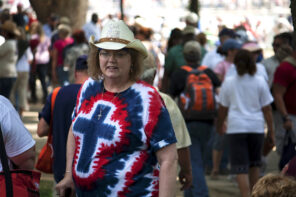Much has been written about the recent Hobby Lobby decision—how it’s a terrible precedent for corporations to be able to ignore laws because they claim a religious opposition, how the ruling will particularly harm poor women, and how the ruling is really bad publicity for the religious right. But what if the ruling that recognizes corporations as having religious beliefs is actually bad publicity for religion as a whole?
In fact, the evidence pretty clearly shows that rulings like Hobby Lobby, the recent Supreme Court’s decision to allow prayer at public meetings, and the new “religious liberty” laws that actually put more religion into public spaces will actually cause Americans—especially younger Americans—to move even further away from organized religion than they have already.
By pushing religion into the public sphere, the religious and political right is unintentionally pushing religion out of people’s private hearts and minds, and moving people out of the pews across America. The number of nones (people with no religious preference) is on the rise, with over 20% of all Americans claiming this status, and many point to the increased politicization of religion as the cause. This trend of legal victories will, in the long run, very likely create a more secular America.
Recent data indicate that this process is already clearly under way. A poll just released by Carnegie Mellon University has found that millennials are often disenchanted with organized religion, with only 52% saying they often look to religious institutions for guidance. Millennials, and Americans in general, are increasingly leaving organized religion behind and are more likely to be liberal than previous cohorts, with 29% of millennials saying there are religiously unaffiliated compared to 21% of Gen Xers and 32% describing themselves as politically independent, compared to 37% of Gen Xers and 50% of the Silent Generation.
Though a number of studies have found that young people were leaving the church because they saw them as intolerant places, it’s unlikely that the conservative religious actors behind the anti-gay rights law that just passed in Mississippi and the Hobby Lobby case realize that their actions are part of—and perhaps a causal source—of this growing disenchantment.
While the consequences for gays and lesbians in Mississippi, where discrimination is now legal, and employees who want to control their own health care decisions are certainly grave, in the long run it’s perhaps even worse for religious establishments in the US that hope to grow—or at best not diminish even further. The religious right might be winning the legal battle, but by doing so they are losing the religious one.




